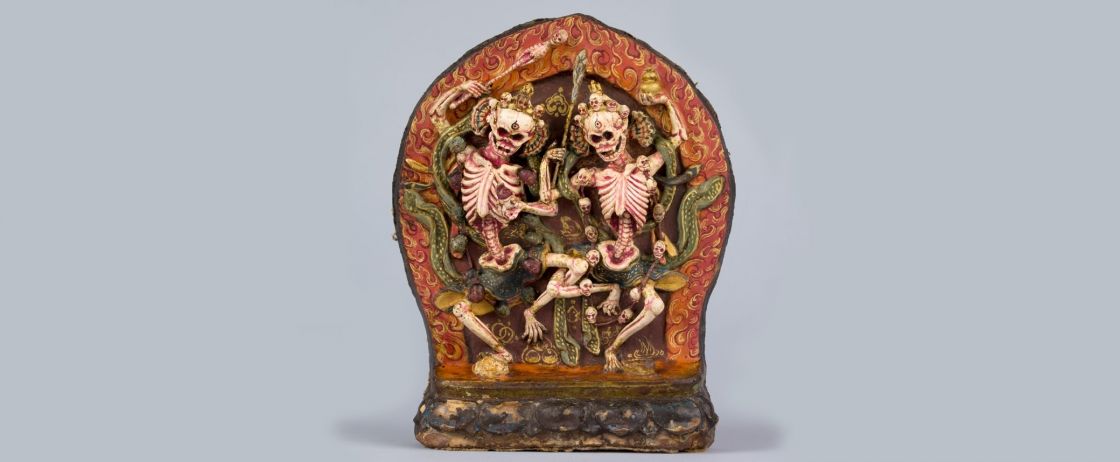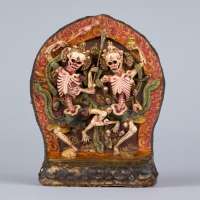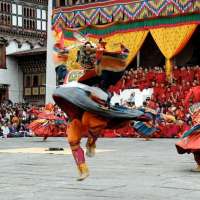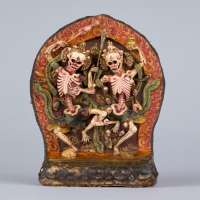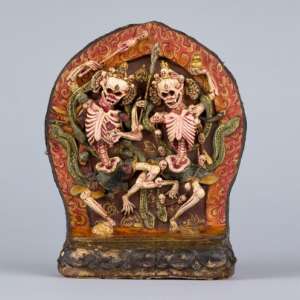
Opening Night Celebration
Death Is Not the End
Friday, 3.17.23
6:00 PM - 10:00 PM
Sold Out
Celebrate the opening of our newest exhibition, Death Is Not the End, a cross-cultural exhibition that explores notions of death and afterlife through the art of Tibetan Buddhism and Christianity. During a time of great global turmoil, loss, and uncertainty, the exhibition invites contemplation of the universal human condition of impermanence and the desire to continue to exist.
The night also marks the launch of our 2023 Spiral issue, Life After. Based on themes from Death Is Not the End, Life After explores moments of change that propel us into the unknown, from birth to death to everything in between, and compel us to imagine what comes next.
Come reflect on what Life After means for you, enjoy free admission and a tour of the new exhibition, experience the Bardo Bench, and toast the new exhibition in the K2 Lounge with DJ Roshni Samlal!
Opening Night Schedule:
- DJ Roshni Samlal performs in the K2 Lounge | 6:00–10:00 PM
- Bardo Bench experience on the theater level | 6:00–10:00 PM
- Opening remarks from the Rubin’s executive director Jorrit Britschgi and Senior Curator, Himalayan Art Elena Pakhoutova | 7:10 PM
- Bardo Incantation by Khenpo Tenzin Norgay Rinpoche and Lama Ugen Rongdrol Palden | 7:20 PM
- Docent-led tour of Death Is Not the End on the 6th floor | 7:30–8: 15 PM
- Music turns up for a dance party | 8:00–10:00 PM
About Death Is Not the End:
Death Is Not the End is a cross-cultural exhibition that explores notions of death and afterlife through the art of Tibetan Buddhism and Christianity. During a time of great global turmoil, loss, and uncertainty, the exhibition invites contemplation of the universal human condition of impermanence and the desire to continue to exist.
The exhibition features prints, oil paintings, bone ornaments, thangka paintings, sculptures, illuminated manuscripts, and ritual items, and brings together 58 objects spanning 12 centuries from the Rubin Museum’s collection alongside artworks on loan from private collections and major institutions, including the Metropolitan Museum of Art, Morgan Library and Museum, Museum aan de Stroom in Antwerp, Wellcome Collection in London, Nelson Atkins Museum in Kansas City, San Antonio Museum of Art, and more.
The exhibition is organized around three major themes: the Human Condition, or the shared understanding of our mortality in this world; States In-Between, or the concepts of limbo, purgatory, and bardo; and (After)life, focusing on resurrection, ideas of transformation, and heaven.

Khenpo Tenzin Norgay Rinpoche was born in Bhutan in 1965. After completing secondary school in 1986, he joined Ngagyur Nyingma Institute, the prestigious Buddhist studies and research center, at Namdroling Monastery in Mysore. At the Institute he studied under Khenchen Pema Sherab, Khenpo Namdrol Tsering, Khenchen Tsewang Gyatso, and other visiting professors, including Khenchen Jigme Phuntsok and Khenpo Pema Tsewang from Tibet. He completed the Shedra program in 1995 and joined the Institute staff, teaching there for three years. He was formally enthroned as Khenpo by His Holiness Penor Rinpoche in 1998 and was assigned by His Holiness to teach at the Buddhist college at Palyul monastery in Tibet. He is the main resident master at Palyul Dharma Center in Queens.

Lama Ugen Rongdrol Palden was born in India, but was sent to Tibet at a very young age to learn the cham dance. He was chosen by H.H. Penor Rinpoche to learn the Palyul cham from the most senior cham masters in Palyul mother monastery in Tibet in the early 1980s, thus becoming the Palyul cham lineage holder. He is often called “Cham-pon” cham master by his students. In 2015 Lama Ugen led sold out adult classes at the Rubin Museum during the exhibition Becoming Another: The Power of Masks. He was also part of Om chanting and solo Bardho Thodrol recording during The World Is Sound exhibition in 2017. He is currently one of the two resident Lamas of Guru Lhakhang New York Palyul Dharma Center in Queens.

DJ Roshni Samlal is a New York–based tabla player who hails from the West Indies, where she was initiated into the ancient tradition of Indian classical music by her vocalist father. She has continued her tutelage in the Benares style of tabla playing under Shri Tapan Modak and is currently a student of the epic Farukhbad exponent Anindo Chatterjee. While her passion is Indian classical tabla, she has also played folk, jazz, and other genres. Samlal has performed at notable local venues such as Knitting Factory, Pianos, and The Bitter End.
Death Is Not the End is supported by the E. Rhodes and Leona B. Carpenter Foundation, Ellen Bayard Weedon Foundation, Robert Lehman Foundation, and The Prospect Hill Foundation.
Lead support for the Rubin Museum is provided by the Milton and Sally Avery Arts Foundation, Bob and Lois Baylis, Barbara Bowman, E. Rhodes and Leona B. Carpenter Foundation, Noah P. Dorsky, Fred Eychaner, Christopher J. Fussner, Agnes Gund, The Robert H. N. Ho Family Foundation Global, Henry Luce Foundation, The Pierre and Tana Matisse Foundation, Mellon Foundation, Matt and Ann Nimetz, Rasika and Girish Reddy, Shelley and Donald Rubin, Tiger Baron Foundation, and Ellen Bayard Weedon Foundation.
General operating support of the Rubin Museum of Art is provided by Daphne Hoch Cunningham and John Cunningham, Anne E. Delaney, Dalio Philanthropies, Janet Gardner, the Estate of Lisina M. Hoch, Andres Mata, Dan Gimbel of NEPC, Inc., The Prospect Hill Foundation, Basha Rubin and Scott Grinsell, Linda Schejola, Eileen Caulfield Schwab, Jesse Smith and Annice Kenan, Tong-Tong Zhu and Jianing Liu, with generous donations from the Museum’s Board of Trustees, individual donors and members, and corporate and foundation supporters.
K2 Friday Nights are supported, in part, by public funds from the New York City Department of Cultural Affairs, in partnership with the City Council.
The Rubin Museum’s programs are made possible by the New York State Council on the Arts with the support of the Office of Governor Kathy Hochcul and the New York State Legislature.
Death is Not the End is supported in part by the National Endowment for the Arts.








Image credits:
Lords of the Charnel Ground, Smashana Adipati; Tibet; 18th century; painted terracotta; Rubin Museum of Art; C2002.36.1 (HAR 65149); photograph by David De Armas, Rubin Museum of Art, 2012
Advanced sales are now SOLD OUT.
Limited walk-up tickets will be available at the door on a first-come, first-served basis.
Can’t join us Friday night? The Rubin is offering free admission March 17–19.

